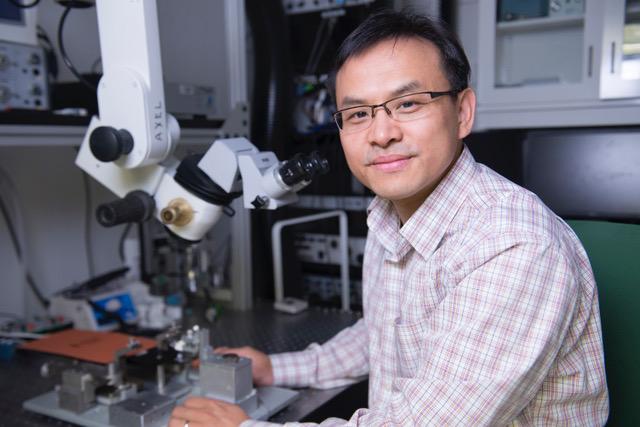He is working to develop new technologies for restoring and enhancing sensory functions and cognition through brain-machine interfaces

Credit: Jane Nisselson/Columbia Engineering
New York, NY–March 05, 2019–Qi Wang, assistant professor of biomedical engineering at Columbia Engineering, has won a CAREER award from the National Science Foundation, one of the highest honors given to young faculty. The five-year $500,000 grant will support his project, “Enhancing perception and cognition while minimizing side effects through closed-loop peripheral neural stimulation.”
Wang studies how sensory information is processed in the brain to form perception and inform an optimal decision, and how this process is modulated by behavioral states, such as attention and arousal. An expert in deciphering the neural codes that underlie our perception and cognition, he is working to develop new technologies for restoring and enhancing sensory functions and cognition through brain-machine interfaces (BMI).
“Perception, cognition, and behavioral performance depend heavily on arousal level,” he explains. “My NSF project is built upon a novel idea: using peripheral neural stimulation to control arousal level to achieve optimal behavioral performance with minimal side effects. I believe this is the first use of an engineering framework to guide the design and validation of optimal, closed-loop neural stimulation for enhancing behavior.”
Wang’s research has long been focused on the locus coeruleus (LC), which plays a pivotal role in modulating brain functions through its regulation of arousal levels. The LC is the primary source of norepinephrine (NE) and scientists think that decreases in NE levels in the brain when the LC is damaged may underlie many neuropsychiatric disorders and neurodegenerative diseases, including Alzheimer’s, ADHD, schizophrenia, autism, and depression. But because the LC is so small and located so deeply within the brainstem, it has been a major challenge to access it safely and to manipulate its activity.
In an ideal world, neural stimulation technology would effectively elicit intended activity in targeted structures while minimizing effects on non-targeted structures. Many previous simulation and experimental results, including Wang’s, have demonstrated that neural responses are sensitive to certain parameters of the stimulus, but finding the optimal stimulus has been very difficult due to the high dimensionality of neural stimulation parameter space.
For his NSF project, Wang proposes to use a safe alternative–vagus nerve stimulation (VNS)–to control LC activity without directly interfacing with the LC.
“There has been a clear lack of an engineering framework to guide the design of VNS stimuli to selectively drive targeted neural structures and to validate this technology in a real-world setting,” he observes. “An ideal neural stimulation technology should allow the system to effectively elicit intended activity in targeted structures while minimizing effects on non-targeted structures.”
With expertise in neuroscience, electrophysiology, control engineering, and behavioral paradigms–and now with the NSF CAREER award–Wang is positioned to create a hybrid computational-experimental framework that specifically focuses on using VNS to enhance behavioral performance with minimal side effects and to enhance human perception, cognition, and behavioral performance using neural stimulation.
###
Media Contact
Holly Evarts
[email protected]
Original Source
https:/




